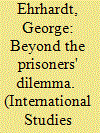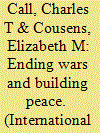|
|
|
Sort Order |
|
|
|
Items / Page
|
|
|
|
|
|
|
| Srl | Item |
| 1 |
ID:
081989


|
|
|
|
|
| Publication |
2008.
|
| Summary/Abstract |
While game theory has a well-established place in the international relations literature, it still has not found a similar place in the undergraduate classroom. With few exceptions, it only appears in introductory textbooks as the nuclear arms race application. This paper endeavors to correct the situation by describing what game theory can add to undergraduate understanding and offering concrete advice for its implementation. After describing the state of game theory in international relations pedagogy, the paper lays out how four different games can help instructors convey abstract concepts. In this paper, I address the concepts of strategic action, perverse incentives, and the importance of communication in an effort to help bridge the gap between a theoretically based curriculum and real-world events. It is hoped that these suggestions will help international relations instructors go beyond the prisoners' dilemma to make game theory a useful item in their pedagogical toolbox.
|
|
|
|
|
|
|
|
|
|
|
|
|
|
|
|
| 2 |
ID:
081987


|
|
|
|
|
| Publication |
2008.
|
| Summary/Abstract |
Since the end of the Cold War, the scope and study of diplomacy has expanded. In the modern diplomatic environment, novel terms such as pipeline diplomacy, coercive diplomacy, diplomacy by sanction and citizen diplomacy are common, alongside the more traditional view of diplomacy as state-to-state activity, monopolized by professional, official diplomats. With such a broad range of views, the scholar can become confused as to what actually constitutes modern diplomacy? In this article, it is argued that the disparity of views in the diplomacy studies field must be classified and consolidated before the enhanced role of diplomacy in the twenty-first century can be better understood. In this article, three different classifications or schools of diplomatic thought are introduced and constructed: the Traditional School, the Nascent School, and the Innovative Sc
|
|
|
|
|
|
|
|
|
|
|
|
|
|
|
|
| 3 |
ID:
081988


|
|
|
|
|
| Publication |
2008.
|
| Summary/Abstract |
The Bush National Security Strategy, even as it calls for "a balance of power that favors freedom," in truth rejects a balance of power approach to international order. It foresees instead the cooperation of all Great Powers under American leadership in furtherance of a common agenda imagined to be founded in universal values. Such rejection of a genuine "balance of power" approach represents a coherent evolution from America's long tradition of foreign policy thought. Emerging from its founding tradition of separation, U.S. strategic thought was influenced both by Theodore Roosevelt's advocacy of military strength in the service of good and Woodrow Wilson's ideological conviction that American engagement in the world could be made conditional on the pursuit of global reform in line with an idealized conception of American values and practices. The conviction that this notional "deal" is still valid provides this administration's ideological bedrock. The Bush worldview should not be seen as a radically new phenomenon, but as a logical outgrowth from the American foreign policy tradition.
|
|
|
|
|
|
|
|
|
|
|
|
|
|
|
|
| 4 |
ID:
081986


|
|
|
|
|
| Publication |
2008.
|
| Summary/Abstract |
Scholars and practitioners of international relations have devoted increasing attention to how cease-fires, once achieved, may be translated into sustained peace. In recent years, the United Nations, the World Bank, and the United States and other governments have revamped their institutional architecture for addressing post-conflict reconstruction and peacebuilding. The creation in 2006 of a UN Peacebuilding Commission exemplifies these changes. The relationship between weak states and the durability of peace has acquired new emphasis in IR research. This article analyzes recent conceptual developments in post-conflict peacebuilding, relating them to new thinking about fragile states. It then analyzes the international architecture for addressing post-conflict peacebuilding, identifying gaps, and analyzing likely policy challenges in the near future. We argue that despite important analytic insights and institutional changes, serious challenges persist in efforts to prevent wars from recurring.
|
|
|
|
|
|
|
|
|
|
|
|
|
|
|
|
|
|
|
|
|